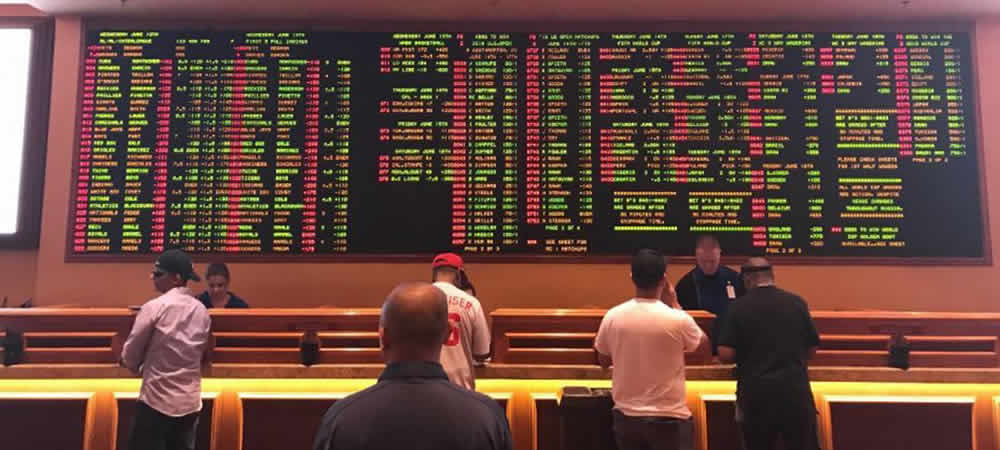- Critics suggest Rhode Island’s sports betting revenues are “off” thanks to gambling lobby lies.
- Democrat Gov. Gina Raimondo allegedly used compromised data to oversell sports wagering’s economic impact.
- The timing of Rhode Island’s sports betting rollout suggests that bad luck is to blame, not political malfeasance.
PROVIDENCE, R.I. – For Rhode Island’s fledgling sports wagering industry, the numbers don’t look good. Critics suggest that Democrat Gov. Gina Raimondo’s initial budget estimate for sports betting revenue was far overblown.
With an allotment of $23.5 million in expected revenue, Rhode Island has to date seen only $300,265. That represents just 2.2% of where the industry should be at this time. Had Raimondo’s estimate been accurate, the state should have generated $13.6 million by now.
On Friday, Paul Grimaldi of the Rhode Island Department of Revenue told Providence news service GoLocal that Raimondo might have been lied to by the sports betting and casino gaming lobbies.
“[T]he revenue estimate ($23.5M) is based on assumptions from an Oxford Economics report commissioned by the American Gaming Association.”
GoLocal further suggests that “experts in Las Vegas” warned that the Rhode Island “numbers were flawed.”
It is worth pointing out that gambling critics living and working in the betting capital of the United States may have a conflict of interest in analyzing the political “merit” of other states’ sports wagering initiatives.
Why The Numbers Are Actually Lower Than Expected
The AGA-commissioned gambling figures cited by Rhode Island clerks in the Raimondo budget are available here. You can research the figures from a similar study conducted by the GMA in 2017 here.
The numbers arrived at by both studies are in line with Rhode Island’s expectations, with one important caveat: the figures assume a mature market.
An even bigger caveat: Raimondo’s budget was predicated on the availability of mobile betting, which has not yet rolled out (bet remains on the way).
Indeed, mobile betting is the key to growth in most betting markets. Currently, sports bettors in the Ocean State are limited to placing their wagers at the Twin River Casino in Lincoln and the Tiverton Casino Hotel in Tiverton. Limited access necessarily equates to limited revenues.
Legal sports betting did not formally kick off until November 26 at the Twin River venue and December 3 at the Tiverton Venue.
Another important aspect here is that Raimondo’s budget was written with the expectation that sports wagering would be up and running in the state before the start of the NFL season.
Given that the NFL season is by far the largest moneymaker for US sportsbooks (accounting for some 70 percent or more of a book’s annual handle), missing the first 12 weeks of the 17-week NFL season is going to crater your estimates no matter what.
The Real Rhode Island Scandal Was Averted
Lost in all this criticism is the fact that Rhode Island voters approved sports wagering via public referendum.
As such, had the state deferred on implementing the will of the people (regardless of how profitable or unprofitable for the state that “will” proves to be), then they’d have an actual scandal on their hands.
Rhode Island residents voted to authorize sports wagering in November 2016. The Professional and Amateur Sports Protection Act (PASPA) was struck down in May 2018. Sports betting wasn’t formally launched in the state until the end of November, nearly seven months later.
Exactly how much longer should Rhode Island have allowed the will of the people to languish?
Advertising Disclosure
In order to provide you with the best independent sports betting news and content LegalSportsBetting.com may receive a commission from partners when you make a purchase through a link on our site.
News tags: Rhode Island | Rhode Island sports betting | RI revenue

Andy has been writing professionally for nearly two decades, with the last three years being dedicated to his primary passions: sports wagering news and gambling industry analyses. A walk-on punter, Andy has a particular interest in professional football, baseball, and horse racing betting. Come early May, you can always catch Andy – clad in all white, mint julep in hand – on Millionaires Row at Churchill Downs. In his dreams.


 Bitcoin Sports Betting Sites
Bitcoin Sports Betting Sites Best Online Sports Betting
Best Online Sports Betting Famous Sports Bettors
Famous Sports Bettors States With Legal Sports Betting
States With Legal Sports Betting Sports Betting Events
Sports Betting Events




